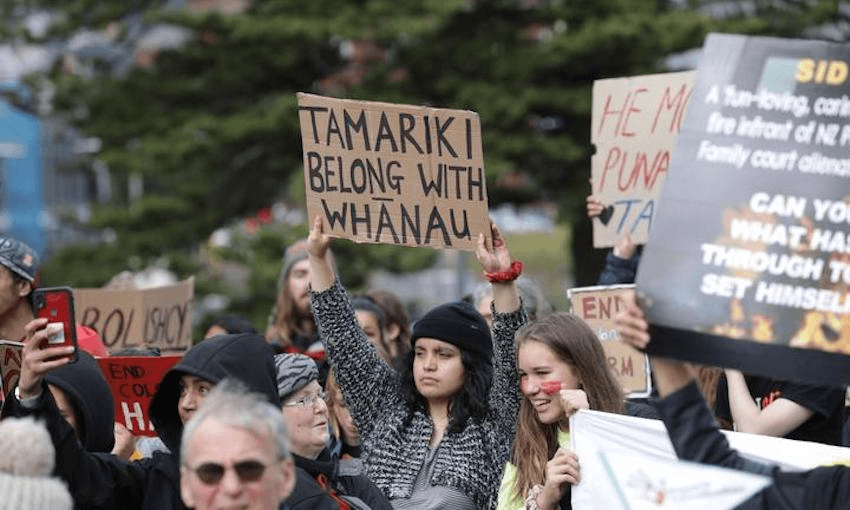A Children’s Commission report released this week shows that entrenched attitudes at Oranga Tamariki are still endangering whānau Māori. This is what colonisation looks like, writes former Oranga Tamariki employee Luke Fitzmaurice.
Children’s Commissioner Judge Andrew Becroft yesterday released the first of two reports into the removal of Māori babies by the Ministry for Children – Oranga Tamariki. The report is one of four launched in response to the attempted removal of a baby in Hawke’s Bay last May, which received widespread media attention. The report from the Children’s Commissioner confirms what many people already knew: the Hawke’s Bay case was not an isolated incident. It makes one thing clear, once and for all: the time for change is now, and change must start from the top.
For those unfamiliar with statutory child protection in New Zealand, the Children’s Commission report makes for horrific reading. The report outlines dozens of stories of intimidation, coercion and racism towards Māori mothers. One mother described the anguish of having her baby removed just moments after giving birth, without having the opportunity to even hug her child. Another mother described feeling that social workers were just waiting for her to relapse into drug use so they could then remove her baby. In perhaps the most horrific story within the report, one mother said she was pressured to have an abortion by her social worker, who warned that if she went through with the pregnancy, she would be at risk of losing both her newborn baby and her other children.
In case it wasn’t obvious, this is what colonisation looks like. The report found that Māori babies were five times more likely to be removed from their families than non-Māori babies. It highlighted “substantial and persistent” inequities for Māori compared to non-Māori. This is the latest milestone in a long history of state violence towards whānau Māori.
Make no mistake, some sort of intervention would have been warranted in many of these cases. Becroft said as much in an interview on the AM Show, stating that in most cases the mothers themselves knew they needed help. Children at risk of suffering violence need to be protected, their safety is always crucial. But how that safety is ensured is also crucial. At present, actions taken by the state in the name of protecting children cause severe harm to whānau, communities and iwi Māori. In many cases, the children themselves are no better off; data released last year shows that children in state care fare worse in every area of their wellbeing compared to children who are not in care.
So what are those at the top saying in response? So far, not much. Radio New Zealand reported that both Oranga Tamariki CEO Grainne Moss and minister for children Tracey Martin refused to be interviewed about the report this morning. But a pre-prepared statement from Moss is revealing. She took aim at Children’s Commissioner Judge Andrew Becroft, criticising the report for its focus on the experiences of mothers when, according to Moss, Becroft’s role “is to support and advocate for the welfare of children”. This is illuminating, as it reveals that Moss sees those two things as separate. In fact, the wellbeing of tamariki Māori is deeply connected to the wellbeing of their whānau. To view the two in isolation is to perpetuate the problem that Oranga Tamariki was created to solve. Ignoring the connections between tamariki and whānau is a form of recolonisation that will cause further damage to Māori communities.
The saddest thing for me when I read this report was that all of the stories felt familiar. I worked at Oranga Tamariki (and Child, Youth and Family before that) for six years. I worked there because, although I knew that the organisation had its flaws, I believed the problems could be addressed if there were enough people working within the system who believed in the kaupapa. I no longer believe that. The sheer volume of these stories, the deep-rooted, intergenerational nature of these problems, and the shameful response from both the CEO and the minister, have led me to believe that change will no longer come from within.
As a nation, we need to do better for these whānau, or we will further entrench the massive problems we already face. That change needs to start today, and it needs to start from the top.
Luke Fitzmaurice (Te Aupōuri) is a former Oranga Tamariki employee and current PhD candidate at Otago University studying child protection, children’s rights and decolonisation.
